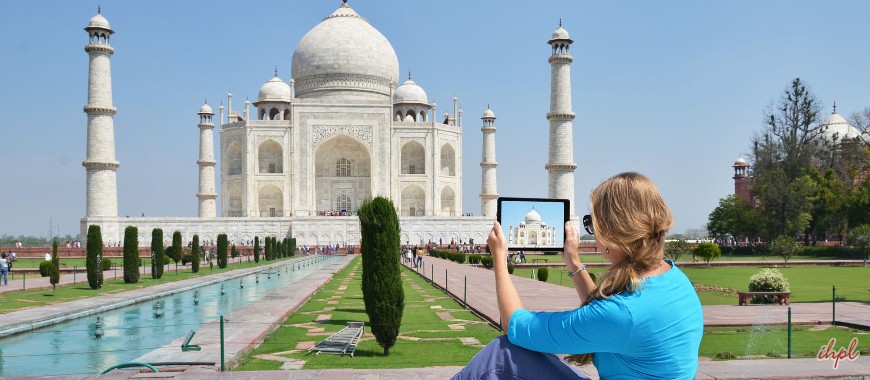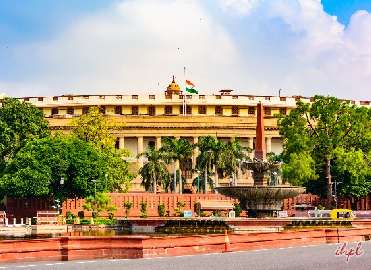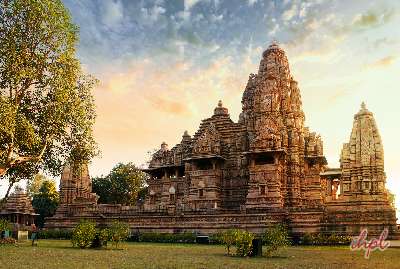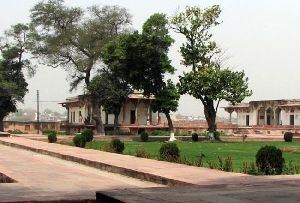Location: Taj Mahal, Agra
Timings: Everyday – 6:00 AM to 6:30 PM (Closed on Fridays)
Ticket Price: Indian: INR 50, Foreigners: INR 1100 (an additional INR 200 for mausoleum)
Ticket Availability: On-site or online through ASI (Archaeological Survey of India)
Activity Duration: Approximately 2-3 hours to explore the entire complex
Planning a Trip? Speak to an expert
The Taj Mahal, a universally admired UNESCO World Heritage Site, is considered one of the world’s seven wonders. Emperor Shah Jahan commissioned this stunning white marble mausoleum as an iconic symbol of love in memory of his beloved wife, Mumtaz Mahal. It is a masterpiece of Mughal architecture, blending Islamic, Persian, and Indian styles. The monument is famed for its symmetrical design, intricate carvings, and changing appearance with natural light throughout the day.
To know more about Agra, you may read this city travel guide on Agra for a comprehensive idea and to know about other historical monuments of Agra you may read this article.
History
The construction of the Taj Mahal was initiated in 1632 and was completed by 1653. Shah Jahan employed the best artisans from all over the globe, including masons, stone cutters, inlayers, carvers, painters, calligraphers, and dome-builders. The Persian architect Ustad Isa designed the great tomb, which ultimately cost the Mughal exchequer 32 million rupees. This structure epitomises Shah Jahan’s eternal love for his wife, Mumtaz Mahal. After Shah Jahan’s death, he was also laid to rest in the mausoleum next to his wife.
Checkout: Agra Tour Packages, Lucknow Tour Packages, Mathura Tour Packages, Uttar Pradesh Tour Packages
Architecture
The Taj Mahal is a crown jewel of Mughal architecture, incorporating elements from Persian, Islamic, and Indian architectural styles. The central dome, which rises 73 meters, is surrounded by four smaller domes and four minarets, each 40 meters tall. The white marble used in the Taj Mahal is inlaid with semi-precious stones, forming intricate floral designs and calligraphy. The tomb’s interior is equally exquisite, with detailed marble work and a delicate lattice screen surrounding the cenotaphs of Mumtaz Mahal and Shah Jahan.Things to do in Taj Mahal
Main Mausoleum: The Taj Mahal’s centrepiece is a marble mausoleum. Admire the intricate inlay work, calligraphy verses, and the dome that dominates the skyline.
Charbagh Gardens: These lush Islamic-style symmetrical gardens are divided into four parts, symbolising a paradise garden with views of the Taj Mahal from various angles.
Mosque and Jawab: To the west side of the Taj Mahal is a mosque facing the Kaaba. Its mirror image, the Jawab, is the right opposite, built to maintain the statue’s symmetry.
Taj Museum: This is located within the Taj complex. It has artefacts, paintings, & documents related to the construction of the Taj Mahal, offering profound insight into its history.
Yamuna River: At the rear of the Taj Mahal, you can boat through or stroll along the banks of the Yamuna River to enjoy views of the Taj’s reflection in the water.
Golden hours: The Taj Mahal is known for its changing hues, from soft pink at dawn to pearl white at noon and golden at sunset. Watching it during these times is a magical affair.
Night Viewing of the Taj Mahal
Experience the Taj Mahal beneath the soft glow of the moonlight and the sky full of stars. The white marble glistens in the dark sky, offering an enchanting experience. Also, witness the Taj Mahal’s reflection in the serene waters of the Yamuna River under the nighttime charm.- A night view of the Taj Mahal is allowed only five days a month, including the full moon night and two nights before and after.
- Nighttime allows a more tranquil experience with fewer crowds, allowing you to soak in this monumental beauty.
- The Taj Mahal, night view tickets are available one week before the full moon dates and can be purchased online through ASI.
- The timings of the night view are from 8:00 pm to 12:00 am, and eight batches of 50 people each are allowed for 30 minutes only.
- The Taj Mahal night view ticket price is INR 510 for Indians, INR 750 for Foreigners, and INR 500 for children.
- Mobiles are strictly prohibited during the night view tour. However, you can take a DSLR, mirrorless camera, or GoPro to capture this ethereal beauty.
- The night view of the Taj is closed on Fridays and during the month of Ramzan.
- One must report to the East Gate of the Taj Mahal at Shilpgram before the scheduled time for the night view.
- You will only be allowed to go to the big gate and nowhere close to the main mausoleum.
Best Time To Visit the Taj Mahal
The best time to visit the Taj Mahal is during late winter to early summer, i.e., from the last week of February to June. At this time, the weather is more relaxed and more pleasant. Early morning visits are highly recommended to witness the Taj Mahal bathed in the soft light of sunrise.
Note: If you are visiting during summer, try exploring between 4-6 PM or early in the morning.
How To Reach the Taj Mahal
By Air: Agra’s Kheria Airport is the nearest airport to the Taj Mahal, approximately 8.6 km away. Regular flights from major cities are available. The flight from Delhi takes about 40 minutes.
By Train: Agra Cantonment is the nearest railway station, 6 km from the Taj Mahal. It usually takes 17 -20 minutes to reach there. Several trains connect Agra with Delhi, Jaipur, and other major cities.
By Road: Agra is well-connected by road, with regular buses and taxis available. The nearest bus stop is Idgah Bus Stand, about 5.5 km away. It usually takes 15 minutes to reach the Taj Mahal.
Local Transport: Auto rickshaws, cycle rickshaws, metros, and electric vehicles are available for local transportation to the Taj Mahal. You can also rent a taxi or book an Ola/ Uber. Horse-pulled carriages and camel carts are also functional.
Places to Visit Near Taj Mahal
You can enhance your travel experience by exploring other renowned tourist attractions when visiting the Taj Mahal, such as:- Agra Fort (3.1 km/ 11 min)
- Itimad-ud-Daulah Tomb (6.7 km/ 22 min)
- Mehtab Bagh (7.9 km/ 27 min)
- Jama Masjid (4.1 km/ 18 min)
- Chini ka Rauza (7.3 km/ 23 min)
- Akbar’s Tomb (18.4 km/ 42 min)
- Mariam-uz-Zamani Tomb (15.8 km/ 38 min)
Travel Tips
Avoid Fridays: The Taj Mahal is closed on Fridays for prayers at the mosque, so plan your visit accordingly.
Minimal Belongings: You can carry minimal belongings to the Taj Mahal; large bags, drones, and tripods are not allowed inside. There are security checks at the entrance. If you carry luggage, you can store it beside the ticket offices for free.
Guided Tours: Hiring a certified guide or audio guide can enhance your travel experience and understanding of the Taj Mahal’s history and architecture. An audio guide costs INR 118.
Photography Tips: Early morning or late afternoon is ideal for capturing the best shots, with fewer crowds and softer lighting. Photography is banned inside the main mausoleum.
Advance Booking: Avoid long queues by booking tickets online through the ASI website. Along with the tickets, a few goodies are included:
- Indian Nationals – 500 ml water bottle & shoe covers
- Foreigners – 500 ml water bottle, shoe covers, tourist guide map of Agra, battery bus, and golf cart services.
Avail Discounts: Keep your Taj Mahal tickets intact to get small entry-fee discounts when visiting the Agra Fort, Fatehpur Sikri, Akbar’s Tomb, or the Itimad-ud-Daulah on the same day.
Wifi Facility: You can now connect to free wifi services at the Taj Mahal, making it the first monument in the country to offer the amenity. Wifi services are free for the first 30 minutes, and after that, you can continue the service at a paid cost of INR 30.
Entry Gates: There are three gates for the Taj Mahal: South, West, and East.
- South Gate: Once used for entry, it is primarily used as an Exit Gate.
- West Gate: This is the main entry point with the most extended lines used mainly by locals.
- East Gate: The popular one with proximity to many hotels & have shorter queues.












